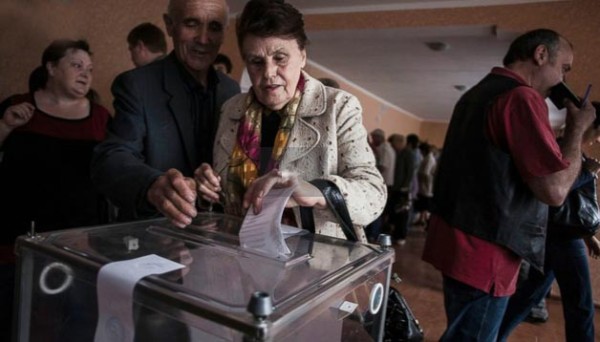Pro-Russian groups have claimed a landslide victory for a hastily organized referendum on self-rule in two parts of eastern Ukraine. The vote was held in the regions of Luhansk and Donetsk less than two months after residents in Crimea voted to secede from Ukraine and join Russia. The Russian government says it respects the results of the referendum but has not indicated any plans to annex eastern Ukraine like it annexed Crimea. The referendum was held under chaotic circumstances with irregular voting conditions and violence between pro-Russian and pro-Ukrainian forces. We are joined by Stephen Cohen, professor emeritus of Russian studies and politics at New York University and Princeton University.
Transcript
This is a rush transcript. Copy may not be in its final form.
AMY GOODMAN: We turn now to Ukraine, where pro-Russian groups have declared independence from Kiev following a hastily organized referendum on self-rule in two parts of eastern Ukraine. The referendum was held in the regions of Luhansk and Donetsk, less than two months after residents in Crimea voted to secede from Ukraine. Roman Lyagin served as the head of the de facto electoral commission for Sunday’s referendum.
Read the full transcript in Democracy Now!
ROMAN LYAGIN: [translated] These results only mean that the people of Donbas demand their opinion be respected, the norms of international law be respected. We demand the right for self-determination, and we will strive toward this. We understand perfectly that no one in the world will recognize this. European organizations and countries in the whole world will not recognize it. But we would like to be listened to, and that is why we held this people’s referendum organized by the people.
AMY GOODMAN: Earlier today, British Foreign Secretary William Hague dismissed the results of Sunday’s referendum in eastern Ukraine.
FOREIGN SECRETARY WILLIAM HAGUE: These votes, these attempts at referendums, have zero credibility in the eyes of the world. They are illegal by anybody’s standards. They don’t meet any standard, not a single standard of objectivity, transparency, fairness, of being properly conducted as a public referendum or election. And, indeed, the people organizing them didn’t really even pretend to meet any of those standards. The important thing is that the Ukrainian elections go ahead on the 25th of May.
AMY GOODMAN: Russian Foreign Minister Sergey Lavrov says that Moscow respects the results of the referendum, but he did not indicate any plans for Russia to annex eastern Ukraine like it annexed Crimea following a similar referendum in March.
FOREIGN MINISTER SERGEY LAVROV: [translated] We respect the will of the residents of the Donetsk and Luhansk regions, and we are of the position that practical implementation of the results of the vote will be carried out in a civilized way, without repetition of violence, through a dialogue between representatives of Kiev, Donetsk and Luhansk.






